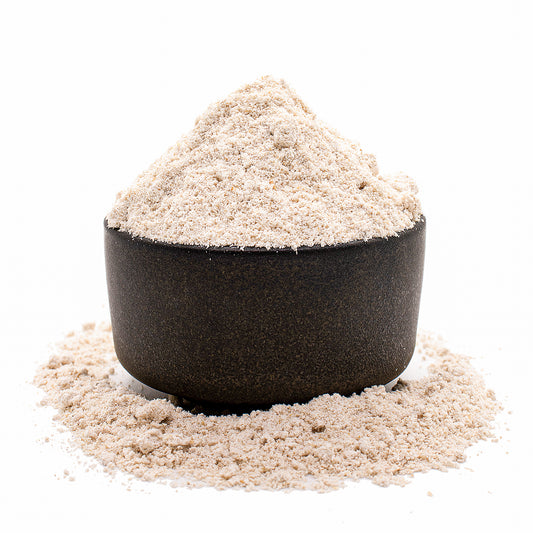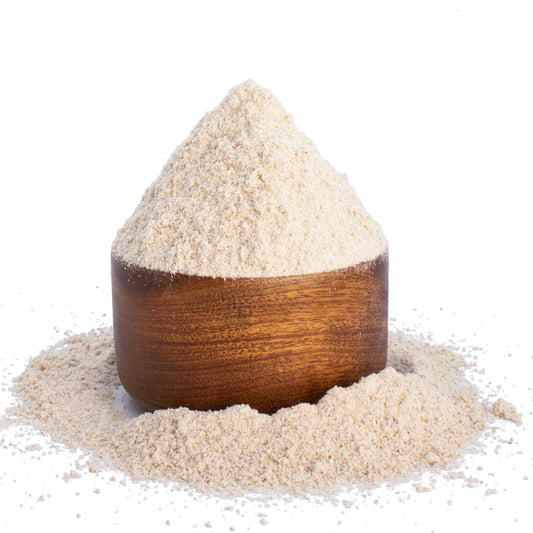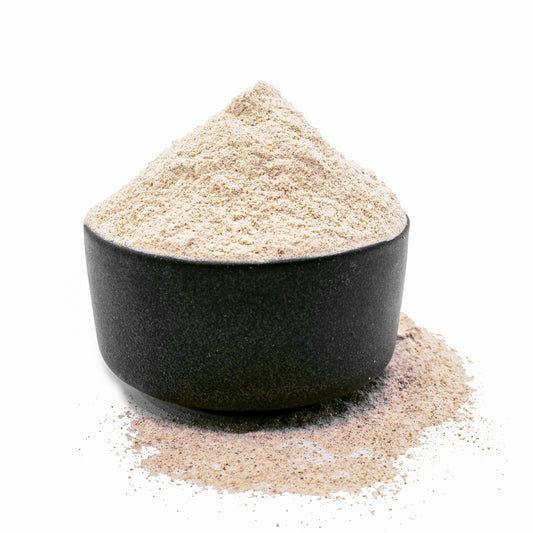-
Buckwheat Flour | Gluten-free | Protein and Fibre Packed
Regular price From Rs. 180.00Sale price From Rs. 180.00 Regular priceUnit price perRs. 200.00Sale -
Emmer Wheat Flour / Khapli Atta | Certified Organic
Regular price From Rs. 375.00Sale price From Rs. 375.00 Regular priceUnit price perRs. 0.00 -
Oat Flour | Stone-Ground, Whole-Grain & Gluten-Free
Regular price From Rs. 225.00Sale price From Rs. 225.00 Regular priceUnit price perRs. 0.00 -
Himalayan Rye Flour | Rich in Dietary Fibre
Regular price From Rs. 300.00Sale price From Rs. 300.00 Regular priceUnit price perRs. 0.00Sold out -
Quinoa Flour | Certified Organic & Gluten-free
Regular price From Rs. 175.00Sale price From Rs. 175.00 Regular priceUnit price per -
Coconut Flour | Defatted | Keto-Friendly
Regular price From Rs. 200.00Sale price From Rs. 200.00 Regular priceUnit price perRs. 0.00 -
Raw Banana Flour | Natural Gluten-Free | Superfood
Regular price From Rs. 200.00Sale price From Rs. 200.00 Regular priceUnit price per -
Defatted Peanut Flour | Plant-Based & Gluten Free
Regular price From Rs. 250.00Sale price From Rs. 250.00 Regular priceUnit price per -
Black Wheat Flour (Certified Organic)
Regular price From Rs. 250.00Sale price From Rs. 250.00 Regular priceUnit price perRs. 0.00 -
Defatted Almond Flour | Unblanched, Keto & Gluten-Free
Regular price From Rs. 200.00Sale price From Rs. 200.00 Regular priceUnit price perRs. 250.00Sale
Looking for healthier, gluten-free, or alternative flours for your baking and cooking needs?
You’re in the right place.
Most store-bought flours are highly refined, stripped of fibre, and often contain bleaching agents. Our flours are different. They’re:
✅ Made in small batches
✅ Free from additives or preservatives
✅ Packed with nutrients and taste
✅ Suitable for gluten-free, keto, vegan, and clean diets
Whether you’re baking a loaf of rye sourdough, flipping fluffy almond flour pancakes, or exploring with banana flour, we’ve got a flour to match your need.
- Almond Flour – A gluten-free, low-carb favourite for keto baking. Ideal for cakes, brownies & cookies.
- Buckwheat Flour – Despite its name, it’s gluten-free! Rich in fibre and earthy in flavour. Great for rotis and pancakes.
- Rye Flour – High in fiber, low in gluten. A gut-friendly flour perfect for sourdough breads.
- Emmer Flour (Khapli) – An ancient wheat grain, low in gluten and full of micronutrients.
- Oat Flour – Naturally sweet, nutritious, and perfect for cookies, muffins & thickening gravies.
- Quinoa Flour – High-protein, gluten-free, and mildly nutty. Best for flatbreads/rotis or nutrient-dense batters.
- Coconut Flour – Absorbs liquid well, ideal for keto baking and gluten-free desserts.
- Banana Flour – Prebiotic-rich and naturally gluten-free. Great for baking or thickening sauces. Good for you body!
- Defatted Peanut Flour – High protein, low fat. Add to shakes, smoothies, or healthy brownies.
Frequently Asked Questions (FAQs)
-
What is the healthiest flour to use daily?
Flours like almond, buckwheat, and oat flour are high in fiber and nutrients. The healthiest one depends on your dietary needs — almond flour is keto-friendly, while buckwheat is gluten-free and rich in minerals. -
Can I replace maida with almond flour?
Yes, almond flour can replace maida in many recipes, especially baked goods. However, it absorbs more moisture, so you may need to adjust liquids and binders like eggs. -
Which flours are gluten-free?
Flours such as almond, buckwheat, oat (certified), banana, coconut, quinoa, and peanut flour are naturally gluten-free. -
What’s the difference between oat flour and oat bran?
Oat flour is made by grinding the whole oat groat, while oat bran is just the fiber-rich outer layer. Oat bran is better for digestive health, while oat flour is better for baking. -
Is buckwheat flour good for gut health?
Yes, buckwheat is high in resistant starch and fiber, which support gut bacteria. It's also gluten-free, making it suitable for sensitive stomachs. -
Is rye flour easier to digest than wheat?
Rye contains less gluten than wheat and has a lower glycemic index, making it gentler for some people. However, it still contains gluten. -
Which flour is best for gluten-free baking?
For general baking, a blend of almond flour and coconut flour works well. Oat flour is great for muffins, and buckwheat is ideal for pancakes or breads. -
Is peanut flour safe for kids?
Defatted peanut flour is safe for most children unless they have a nut allergy. It’s high in protein and works well in smoothies and baking.




















